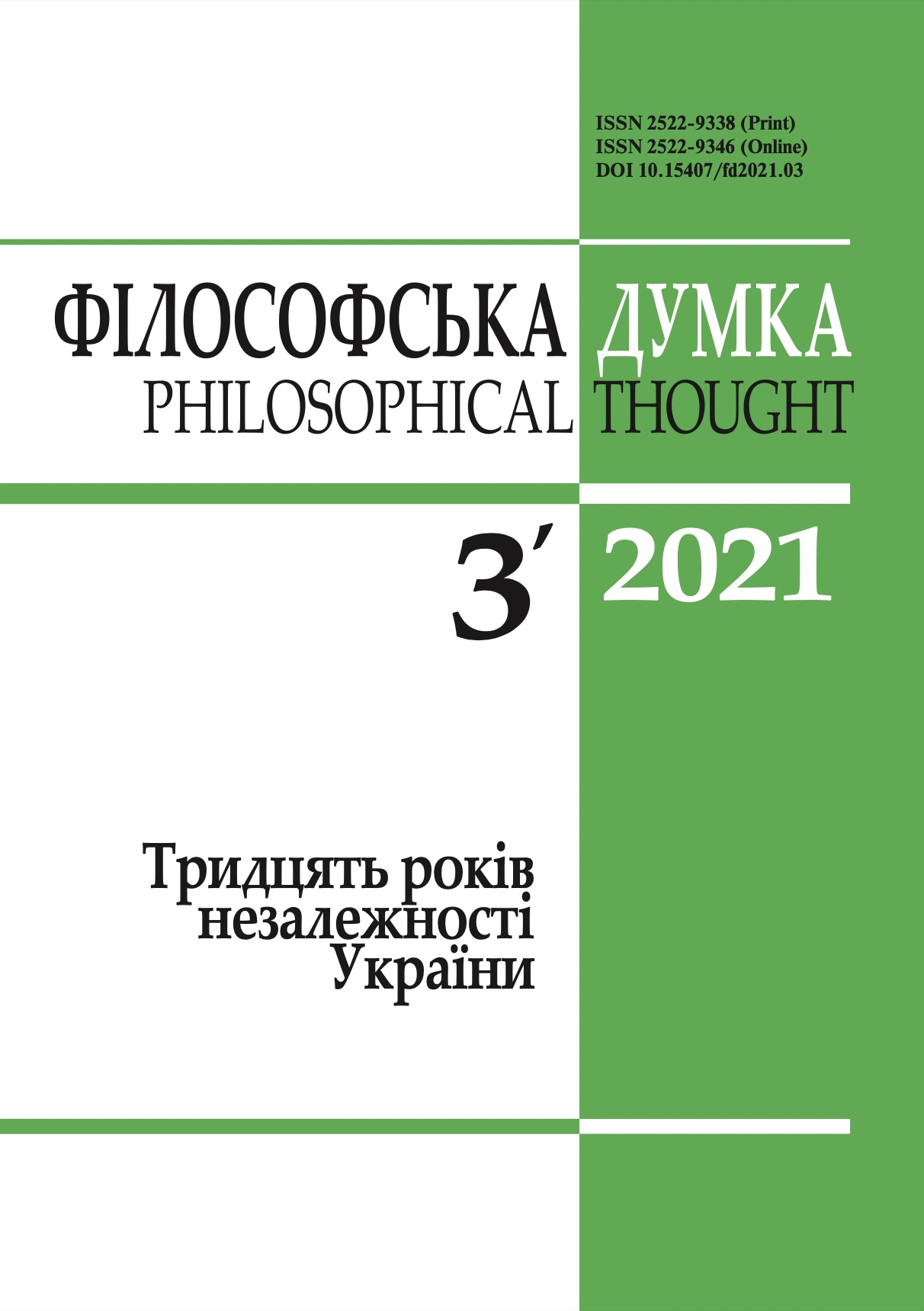Політичний популізм і популярна культура
ПОЛІТИЧНА ФІЛОСОФІЯ
DOI:
https://doi.org/10.15407/fd2021.03.125Ключові слова:
популярна культура, політичний популізм, типи популізму, медіа, знакова репрезентаціяАнотація
У статті здійснено порівняльний аналіз культурних практик політичного популізму і популярної культури. Популістичного політика розглянуто як знак культурної комунікації і вио- кремлено три його ідеальні типи: пустий знак, орієнтований на сьогодення, який репрезентує популістів без ідеології; знак, орієнтований у минуле, який репрезентує популістську націоналістичну ідеологію; знак, орієнтований у майбутнє, який репрезентує реформаторів суспільних цінностей. Виявлено спільні характеристики в інтерпретації та функціюванні популярної культури та популізму — символізм, емоційність, походження «від простих людей», спротив системі, експлуатація прагнення емансипації. Підкреслено визначальну роль медіа у культурній комунікації як для популярної культури, так і для політичного популізму. Певне оновлення та урізноманітнення політичних інституцій стане тим критерієм, який дасть змогу визначити — що саме було вартісним у популярній культурі та політичному популізмі.
Посилання
Beime, K. (2008). The political theories of modernity. [In Ukrainian]. Kyiv: Stylus.
Bart, R. (1989). Imagination of the sign. [In Russian]. In: Selected works. Semiotics. Poetics (pp. 246-252). Moscow: Progress.
Weber, M. (1998a). "Objectivity" of socio-scientific cognition. [In Ukrainian]. In: Sociology. General historical analyzes. Politics (pp. 192-263). Kyiv: Osnovy.
Weber, M. (1998b). Three pure types of legitimate domination. [In Ukrainian]. Sociology. General historical analyzes. Politics (pp. 192-263). Kyiv: Osnovy.
Guzhva, A. (2018, September). Free man and the limits of solidarity. [In Ukrainian]. In: H.S. Sko- voroda's creativity as a metatext of Ukrainian culture. In memory of Myroslav Popovych: ma- terials of 26 Kharkiv International Skovorodyniv Readings, (pp. 292-295). Kharkiv: Maidan.
Guzhva, A. (2011). Parade as a secularized ritual. [In Russian]. Practical Philosophy, 2, 171- 177.
Yermolenko, V. (2018). Liquid ideologies. Ideas and politics in Europe of the XIX-XX centuries. [In Ukrainian]. Kyiv: Duh i litera.
Kiyanka, I.B. (2019). The modern aspect of populism in the context of ideological norms. [In Ukrainian]. Democratic governance: scientific bulletin, 1 (23). Lviv: LRIDU NADU. Retriev- ed from: http://dv.lvivacademy.com/article/view/181480.
https://doi.org/10.33990/2070-4038.23.2019.181480
Liutyi, T. (2019). Mass and popular culture: the problem of demarcation. [In Ukrainian]. Scien- tific notes of NaUKMA. Philosophy and Religious Studies, 3, 85-99.
https://doi.org/10.18523/2617-1678.2019.3.85-99
Pierce, C.S. (2000). Logical foundations of sign theory. [In Russian]. St. Petersburg: Laboratory of Metaphysical Research at the Faculty of Philosophy, St. Petersburg State University; Ale- theia.
Fukuyama, F. (2020). Identity. The need for dignity and the policy of resentment. [In Ukrainian]. Kyiv: Nash Format.
Shcherbak, S. (2020). Populism from the perspective of political philosophy. [In Ukrainian]. Philosophical thought, 3, 61-78.
https://doi.org/10.15407/fd2020.03.061
Borja, A.L. (2020). Neither Shadow nor Spectre: Populism as the Ideological Embodiment of the Democratic Paradox. Theoria: A Journal of Social & Political Theory, 67 (162), 45-70.
https://doi.org/10.3167/th.2020.6716203
Brubaker, R. (2017). Why populism? Theory and Society, 46 (5), 357-385.
https://doi.org/10.1007/s11186-017-9301-7
Debord, G. (1996). La société du spectacle. Paris: Gallimard.
Hall, S. (1973). Encoding and decoding in the television discourse. Centre for Cultural Studies, University of Birmingham: Manuscript.
Hall, S. (2009). Introduction. In: Representation: cultural representation and signifying practices (pp. 1-12). London: SAGE Publications; Thousand Oaks: The Open University.
Halvik, V. (2019). Technocratic Populism and Political Liberalism in Central Europe. Problems of Post-Communism, 66 (6), 369-384.
https://doi.org/10.1080/10758216.2019.1580590
Lutovac, Z. (2020). Populism and the Defects of Democracy in Serbia. Horizons: Journal of International Relations and Sustainable Development [Special Double Issue: The Populism Issue], 15, 192-205.
Mazzoleni, G. (2008). Populism and the Media. In: Twenty-First Century Populism: The Spectre of Western European Democracy (pp. 49-64). Basingstoke England; New York: Palgrave Macmillan.
https://doi.org/10.1057/9780230592100_4
Mcluhan, M. (2001). Understanding Media: The extension of Man. London; New York: Routledge Classics.
Müller, J.-W. (2017). Was ist Populismus? Ein Essay. Berlin: Suhrkamp.
Rego, C. (2015). Under the Spell of Populism: Popular Culture and Intellectuals in Brazil. Studies in Latin American Popular Culture, 33, 164-178.
https://doi.org/10.7560/SLAPC3311
Storey, J. (2018). Cultural theory and popular culture: an introduction. London; New York: Routledge.
##submission.downloads##
-
PDF
Завантажень: 291
Опубліковано
Як цитувати
Номер
Розділ
Ліцензія
Автори, які публікуються у цьому журналі, згодні з наступними умовами:
- Автори зберігають авторське право і надають журналу право першої публікації.
- Автори можуть укладати окремі, додаткові договірні угоди з неексклюзивного поширення опублікованої журналом версії статті (наприклад, розмістити її в інститутському репозиторії або опублікувати її в книзі), з визнанням її первісної публікації в цьому журналі.
- Авторам дозволяється і рекомендується розміщувати їхню роботу в Інтернеті (наприклад, в інституційних сховищах або на їхньому сайті) до і під час процесу подачі, так як це може привести до продуктивних обмінів, а також скорішого і ширшого цитування опублікованих робіт (див. вплив відкритого доступу).


